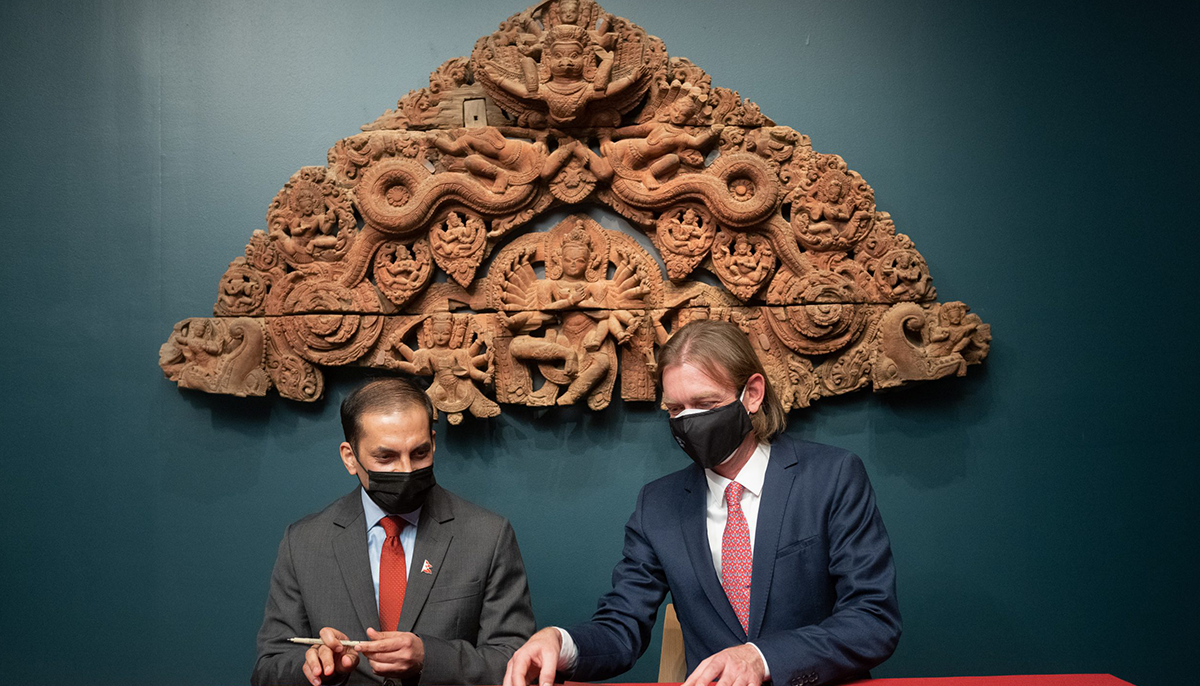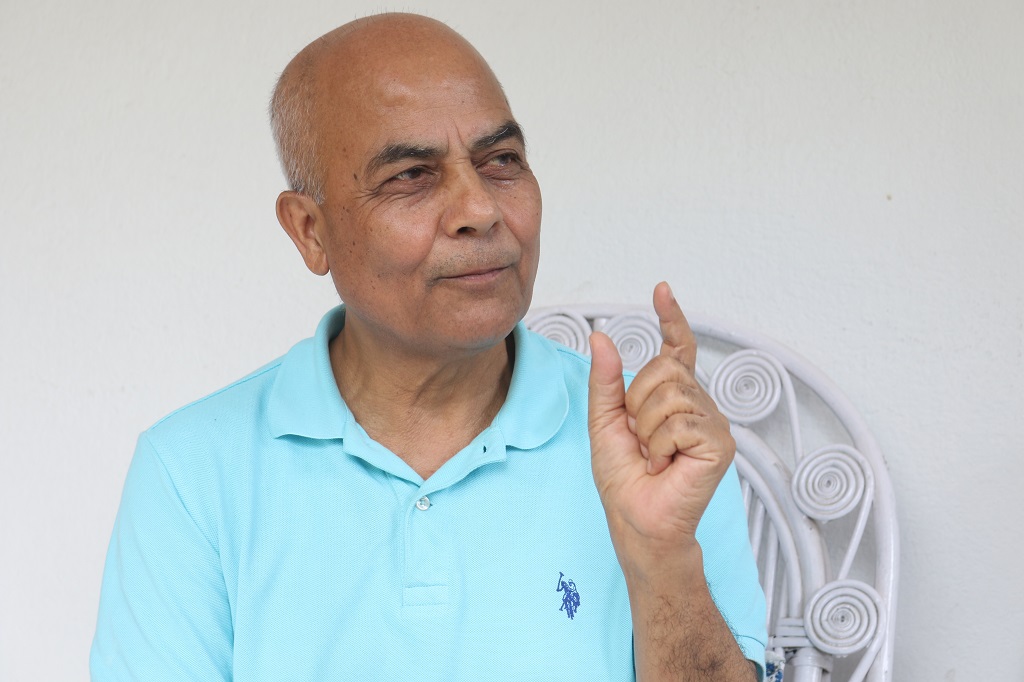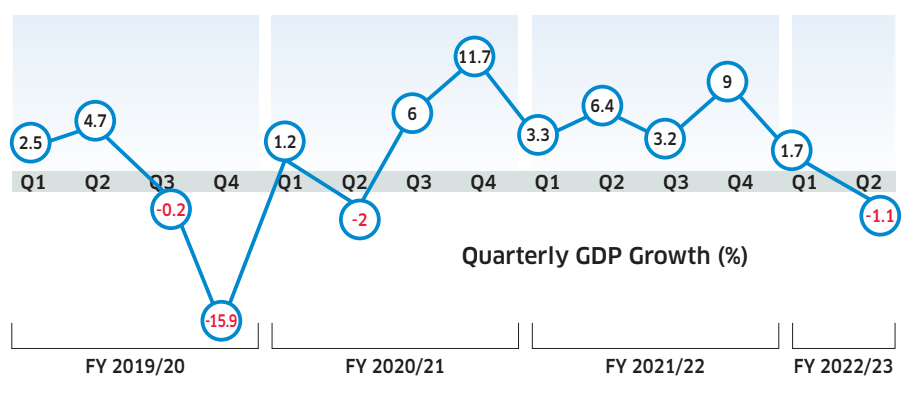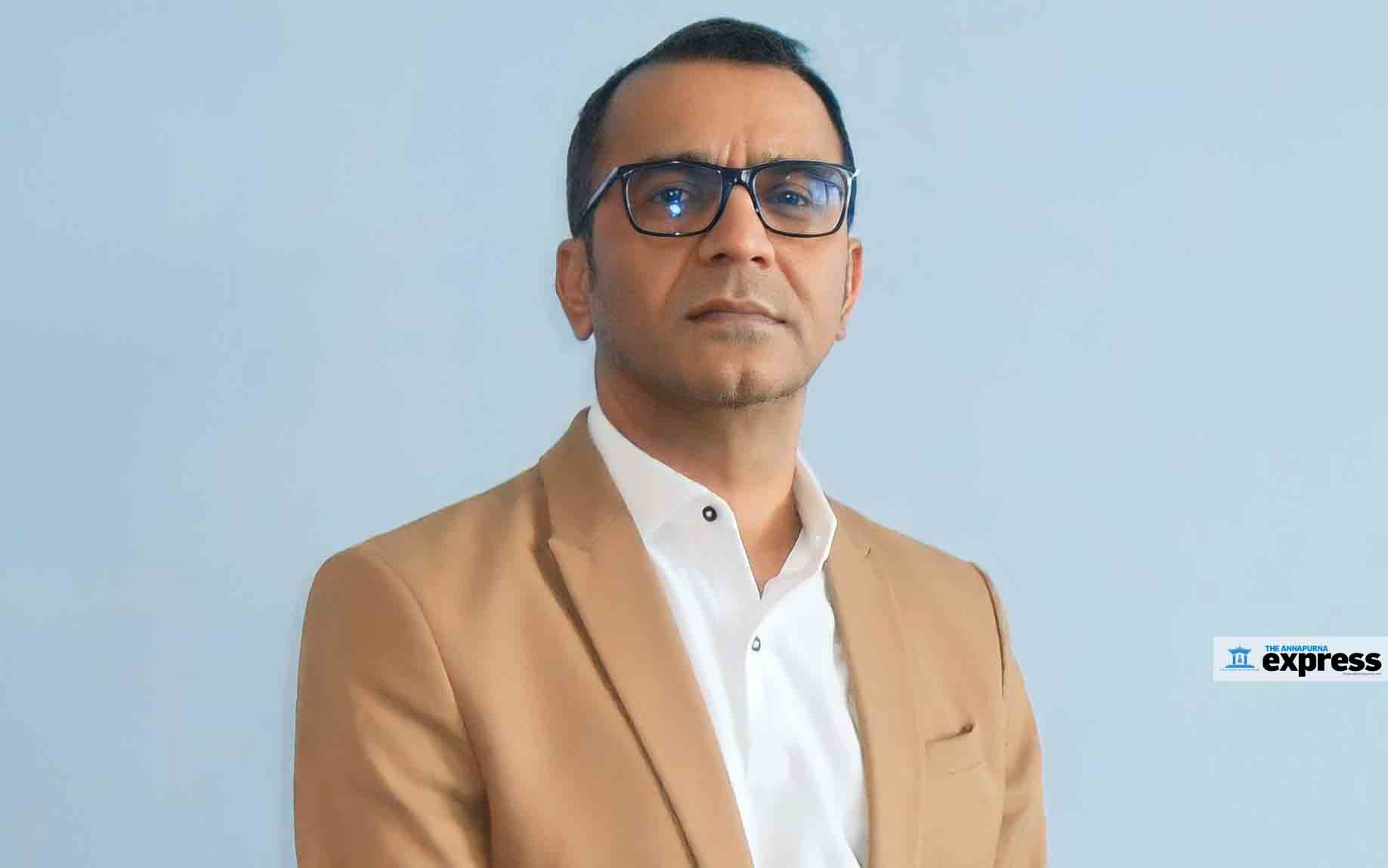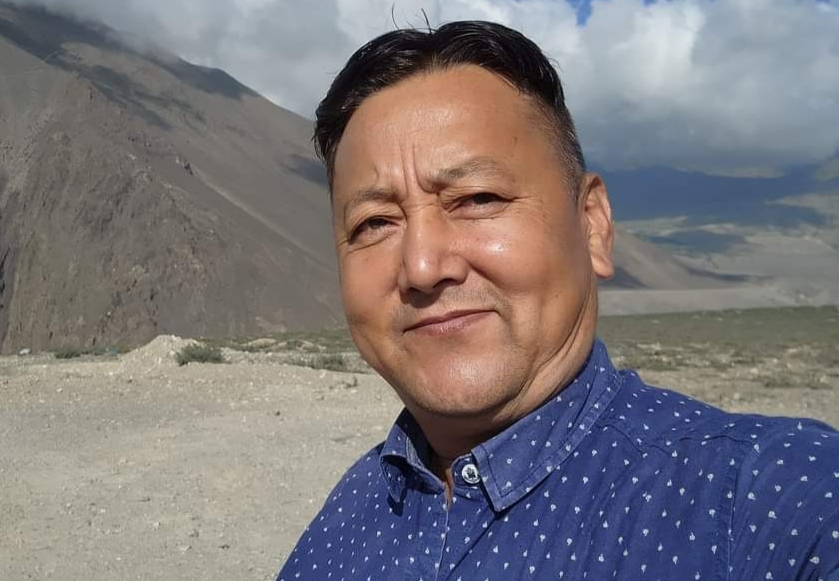Stolen artifacts returned to Nepal
The Embassy of Nepal in Washington, DC has received 40 Nepali wooden artifacts dating back to the 19th-20th century from the Homeland Security Investigations (HSI) of the Department of Homeland Security (DHS), USA. The artifacts smuggled from Nepal were confiscated in Honolulu, Hawaii by the United States Customs and Border Protection on 18 Aug 2010. Nepal had officially requested the Government of the United States to return these objects to Nepal in 2011.
In the handover ceremony held on Sunday, Nepal’s Ambassador to the US, Sridhar Khatri, extended his sincere thanks to the DHS, the Department of State, media and art and heritage campaigners for their support in retrieval and repatriation of the artifacts. He particularly appreciated and thanked the investigators and staff members of the DHS and HSI for their hard work and dedication in recovering the objects of art handed over today and other artifacts that were recovered earlier.
Deputy Assistant Director of the Homeland Security Investigations (HSI) Ricardo Mayoral expressed his happiness on the successful return of these important artifacts to the Government of Nepal after long investigations. He also assured that the HSI will extend fullest cooperation to the embassy for repatriation of other stolen and lost artifacts of Nepal.
Acting Deputy Assistant Secretary of the Department of State Scott Urbom stated that the United States will continue its cooperation and collaboration with Nepal to preserve and restore its rich art and architectural heritages. He said that the successful recovery of the illegally exported artifacts is a major achievement. The trove of the artifacts handed over to the Embassy includes 39 engraved and painted wooden panels and a carved wooden shrine, among which the four panels were randomly selected for display during the handover ceremony.
Photographs of other artifacts were displayed separately to give the audience a flavor of what the remaining pieces would look like. These precious Nepali artifacts are estimated to date back to the period between the 19th and 20th century. They signify various aspects of Lord Buddha’s life and his teachings as well as the Buddhist religious and cultural values and practices. As part of efforts to recover and repatriate the lost and stolen heritages of Nepal, the embassy has been actively engaged with relevant agencies of the governments of Nepal and the United States.
The embassy had repatriated to Nepal seven artifacts—stone statues of Uma Mahesvara, Chaturmukh Shivlinga, Nagaraja, Padmanpani and Shakyamuni Buddha—on 18 May 2022; and a wooden statue of Nritya Devi and a standing stone statue of Lord Buddha on 28 April 2023. The embassy said it will send the artifacts received on Sunday to the Department of Archaeology of Nepal as soon as possible.
Setting the record straight: Parties submit their audit reports to EC
Most of the major political parties recently submitted their audit report of fiscal year 2021/22. The political parties—registered at the Election Commission (EC)—are required to maintain real accounts of their income and expenditure, appoint a responsible official for this purpose, audit their income and expenditure within six months of the end of the financial year and submit it to the commission within one month after auditing by a licensed auditor in accordance with the law, says the Article 269 of the Constitution of Nepal 2015 and the Political Party Act, 2017.
According to an EC source, 83 political parties have submitted the report on time. “We are planning to ask those who haven’t submitted the report to submit explanations with valid reasons for not maintaining their accounts and submitting audit reports,” a top EC official told ApEx. The EC, within 45 days of the expiry date of audit report submission, can direct a political party failing to submit its audit report to furnish clarifications with reasons through electronic or other media. According to the audit report, CPN-UML has the highest income and expenditure. The party has mentioned that it had an income of Rs 417,220,317 in the fiscal year 2021/22. The party has said that its expenditure amount is exactly the same as the income.
In the income category, the party has included membership fees, levies and renewals, support and donations, publication sales, natural calamity relief and miscellaneous income. Election, office management, publication, capital expenditure and investment and miscellaneous costs are included in the expenses category. Nepali Congress, currently the largest party of Nepal, has shared that its income for the fiscal year 2021/22 was Rs 148,994,087. The party’s expenses were Rs 179,078,222. This means the party was in loss in the fiscal year 2021/22 by around Rs 30m.
Similarly, the CK Raut-led Janamat Party also suffered a loss of around Rs 9m. While the party had spent Rs 10,150,000, according to the audit report, it had an income of only Rs 190,000. CPN (Maoist Center), who is currently leading the government, had an income of Rs 90,086,064 and expenditure of Rs 74,264,043 in the fiscal year 2021/22. Janata Samajbadi Party, Nepal, led by Upendra Yadav, was in good profit, says the party’s audit report. Their income was Rs 15,166,515 while they spent Rs 5,753,339.
Like the UML, Nepal Majdoor Kishan Party also mentioned their income and expense amount were exactly the same (Rs 8,666,664). Rastriya Prajatantra Party’s income was Rs 32,116,450 and expense was Rs 31,968,786. The CPN (Unified Socialist) has mentioned their income as Rs 71,590,377 and expenditure as Rs 60,529,529 in their audit report for the fiscal 2021/22. The newly formed Rastriya Swatantra Party has also submitted its audit report, which shows that they had an income of Rs 410,010 and the expenditure of Rs 178,255.
A political party failing to maintain or audit its incomes and expenditures or submit audit reports or submit clarifications as directed can be fined up to Rs 20,000, according to existing provisions. In case a political party fails to submit its audit report for three consecutive years, it could be fined up to Rs 50,000 and the commission can direct it to make corrections within six months.
The EC can scrap the registration of a political party committing the fault more than one time or failing to follow the given directive in this regard within one year or failing to pay the imposed fines. Last year, the commission scrapped the registration of 44 political parties for not submitting their audit reports for three consecutive years, despite multiple deadline extensions. As of now, there are 119 registered political parties.
‘Parties are not transparent ’
Bhojraj Pokharel Former Chief Election Commissioner
Nepali political parties are not transparent. They never let you know where they get their so-called support and donation. They don’t even put it in the audit report. These donations are often the reason for internal party disputes. They have internal competition over who collected the most funds and who gets to spend it. This hampers the party structure and organization. Yet, they are not ready to correct themselves. They hire private ‘puppet’ auditors for their bookkeeping. Auditors working for political parties are hiding dirty finances involved in politics.
The Election Commission has the right to investigate the audit report of political parties if they find any suspicious activity or if there are complaints. But the commission, too, ignores it. The audit report is just a formality. This bad culture has been developed for a long time. Unless these parties make their internal work transparent, how can we expect their better commitment for the country?
Big corporate houses and businesspersons and fund the parties secretly, as they too have their motive to fulfill from the political leadership. Ethical enforcement of laws is necessary to make the political parties correct. Or else, every year, they submit an audit report that shows nothing.
Asia Cup: A dream come true for Nepal
Nepal have won the ACC Men’s Premier Cup, making its way to the Asia Cup for the first time. This is indeed a dream come true for Nepali cricket team and supporters. In the final held at the TU Ground, Kirtipur, Nepal defeated the UAE by seven wickets to secure its place in the Asia Cup scheduled to take place in Sept 2023.
Nepal had won against the same side in March, landing a berth in the ICC Men’s Cricket World Cup Qualifiers. Nepal will compete in Group A against Pakistan and India. Group B consists of Bangladesh, Sri Lanka, and Afghanistan.
Nepal chased the target of 118 runs in 30.3 overs with the loss of three wickets. Gulsan Jha and Bhim Sarki shared an unbeaten partnership of 96 runs. They contributed 67 and 36, respectively. Jha hit six sixes and three fours in 84 balls and Sarki hit four fours in 71 balls. Jha now has two fifties at a young age of 17 in his ODI career. The first one was in the final and deciding match for the World Cup qualifier against the UAE. The second one on Tuesday, again against the UAE which too was a historic final for Nepal.
The UAE’s Rohan Mustafa took two wickets and Aayan Afzal Khan took one. The UAE scored 117 runs at the cost of all their wickets in the first inning. They lost the toss and were asked to bat first. Asif Khan made 46 for the team with seven fours and one six. Aryan Larka scored 13 runs on 28 balls.
For Nepal, Lalit Rajbanshi took four wickets followed by two each by Karan KC and Sandeep Lamichhane and one each by Gulsan Jha and Sompal Kami. Rain forced a halt of the game on Monday at 27.3 overs, forcing it to be continued on Tuesday. With just one wicket in hand, the UAE had scored 106 runs on the first day. Gulsan Jha was named the player of the match and Sandeep Lamichhane, the player of the series. Lamichhane took 13 wickets in this tournament.
As the top three finishers at the Premier Cup, Nepal, the UAE, and Oman will compete in the ACC Emerging Teams Asia Cup in July against five-member ‘A’ Teams from the region. The team received praise from Prime Minister Pushpa Kamal Dahal for their performance. He promised to promote and reward Nepali cricketers for their hard work and achievements. Deputy Prime Ministers Narayan Kaji Shrestha and Purna Bahadur Khadka attended the final game at TU Cricket Ground.
Cancellation rumors
The Board of Control for Cricket in India (BCCI), the cricket governing body of India, has declared that the Indian team would not travel to Pakistan for the Asia Cup due to security concerns. Pakistan is scheduled to host the Asia Cup 2023 in September.
The BCCI is allegedly intending to stage a brand-new five-nation tournament as a warm-up for the ODI World Cup 2023 after rejecting the Pakistan Cricket Board (PCB)’s ‘hybrid model’ for hosting the Asia Cup 2023.
The Indian team will play its matches outside of Pakistan while the other teams play there, according to a hybrid model that Pakistan has proposed to the Asian Cricket Council (ACC). However, the BCCI wants the entire tournament moved somewhere else. And the PCB has asserted that if they lose their hosting rights, they will not take part in the competition.
The BCCI and the PCB remain firm in their positions on the Asia Cup hosting, which has been a hot topic in recent weeks. Additionally, there have recently been rumors that the Asia Cup will be canceled or postponed. However, the ACC will have to call an Executive Board meeting to postpone or cancel the event. The meeting may be called by the chairman Jay Shah, who also serves as the BCCI’s secretary, within seven days.
Inside Sports quoted an ACC source: “To date, there has been no indication of any such meeting.” According to a report in the Pakistani media, PCB would not consent to hosting the Asia Cup at a neutral venue and no such ‘neutral venue’ proposal or notice has been sent to the member countries as of Monday, according to Inside Sports.
If these two strong teams stick to their commitment on Asia Cup hosting, Nepal, an emerging team who fought for its place for the cup, will have its dream killed due to an unnecessary power tussle.
Rocky road ahead for national economy
It’s official. Nepal’s economy is going through a deep recession. According to the National Statistics Office (NSO), the country’s economic growth has turned negative in the second quarter of the current fiscal year. In its economic growth projection for the second quarter, NSO said the gross domestic product (GDP) growth has been negative by 1.1 percent. GDP growth has suffered this fiscal largely due to tight monetary policy, slackened domestic demand, the unwinding of the Covid-19 stimulus, and persistent global headwinds.
With the sharp slowdown in economic activities and higher interest rates, the country’s economy has been under pressure from the start of FY 2022/23. The economy grew by a meager 1.7 percent in the first quarter of the current fiscal year. The last time when the country’s GDP turned negative was in the second quarter of FY 2020/21 when the economy was reeling under the Covid-19 pandemic. This year, the slump in the construction, mining, transport, and manufacturing sectors, and wholesale and retail trade dragged down the overall economic growth.
The NSO report shows the mining sector grew by negative 16.4 percent while the construction sector is negative by 20.6 percent. Similarly, the wholesale and retail trade’s growth turned negative by 9.7 percent while the manufacturing sector is also negative by 4.3 percent.
According to NSO, the growth of the manufacturing sector is likely to decelerate further due to higher interest rates, import restriction measures, and the slowdown in domestic consumption. A dampened external demand has affected manufacturing and construction subsectors. The mining and construction sector has been going through a prolonged slump due to a sharp decline in the demand for cement, steel, and other construction materials. The demand for cement, steel, sand, and other construction materials has decreased with construction activities in the country coming to a halt.
The decline in public construction and the downturn in private house construction have resulted in a decrease in the consumption of construction materials. The import restrictions and falling market demands have hit the wholesale and retail trade. Credit control measures and a hike in interest rates have slowed down real estate, wholesale, and retail trade activities. Experts say a negative economic growth rate indicates a grinding halt in economic activities.
Economist Chandra Mani Adhikari said the slowdown in economic activities has impacted the country's economic growth. “The government has not been able to pay more than Rs 60bn to the contractors,” said Adhikari, “This has affected the cash flow not only in the construction sector but also in industries like cement, steel, and other construction materials.”
According to Adhikari, the disruption in the cash flow has made it difficult for businesses even to repay the loans of the banks. The only silver lining is, the growth of the hotel and restaurant services sector has increased by 20.4 percent in the second quarter of this fiscal year compared to a growth of 2.2 percent in the second quarter of last fiscal year.
The NSO report is in line with the growth estimates of the World Bank (WB) and Asian Development Bank (ADB). Both WB and ADB have projected that Nepal's economic growth would grow at 4.1 percent this year.
Jorg Bahr: Two decades for Nepali education
Rabindra Puri Foundation for Conservation (RPFC) on Friday organized a farewell program for Jorg Bahr, who has been doing philanthropic work in Nepal for over two decades. Born in Germany in 1940, Bahr came to Nepal in 1999 after his retirement as German Army Colonel and started working for the improvement of Nepal’s education with a main focus on rural areas, it was informed at the program.
Realizing that there will be no development of the community and the country without education, his organizations have been supporting the construction of infrastructure for 12 community schools like school buildings, science labs, computer labs and providing scholarships as well as educational materials.
“After retiring from my job 22 years ago, a Rotarian professor friend brought me to Nepal and since then I started visiting Nepal 2-3 times a year,” Bahr said. I have become a part of education-health programs in operation in Nepali villages. Thus, I have become a German by birth and a Nepali by deed.” 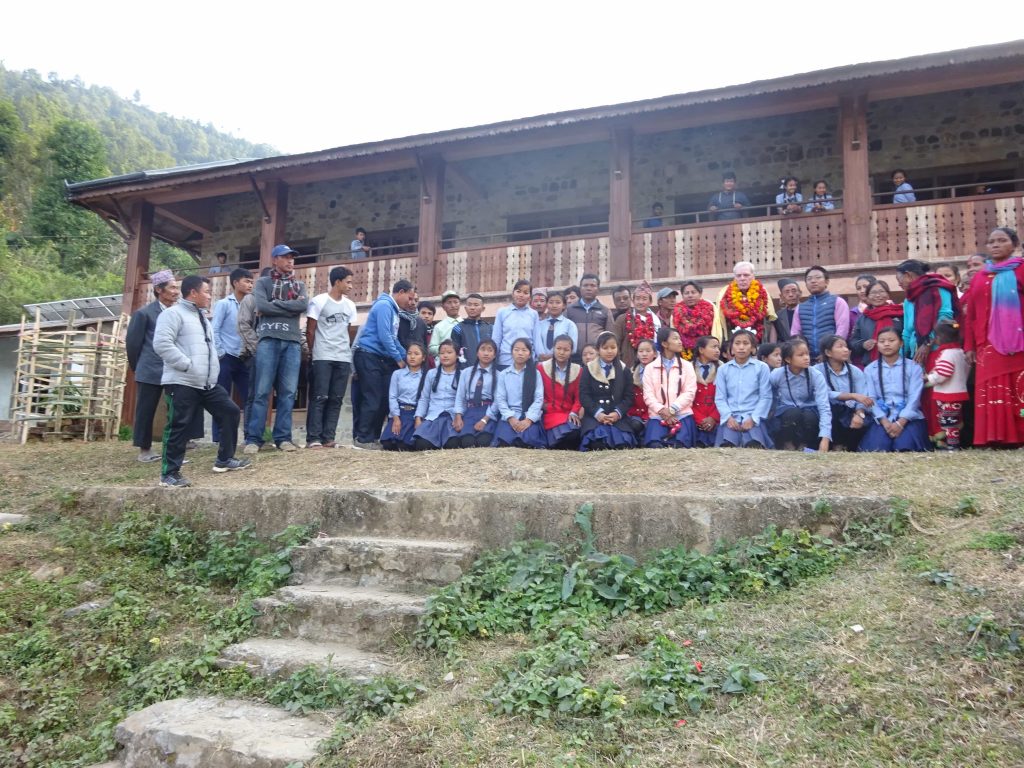 In 2009, he established ‘Schulerhilfe fur Nepal’ (School help for Nepal), which has constructed nine out of 12 planned school buildings and associated infrastructure—in Kavre, Gorkha, Bhaktapur, Ramechhap, Gorkha and Nawalparasi through RPFC—per information provided at the program.
In 2009, he established ‘Schulerhilfe fur Nepal’ (School help for Nepal), which has constructed nine out of 12 planned school buildings and associated infrastructure—in Kavre, Gorkha, Bhaktapur, Ramechhap, Gorkha and Nawalparasi through RPFC—per information provided at the program.
Nepal Vocational Academy (NVA), operating from Kamalbinayak (Bhaktapur) in collaboration with the Schulerhilfe fur Nepal and RPFC, aims to produce 100 skilled personnel every year. In Thambesi, a village in Nawalparasi, around 250 students study at Chhatisdevi Secondary School, which boasts of a well-equipped and solar-powered computer lab, courtesy of Schulerhilfe fur Nepal.
Saraswati Primary School in Kavre, Bhimeshwar Basic School, Sri Krishna High School and Shatlingeshwar Higher Secondary School in Ramechhap have new infrastructure, with help from Schulerhilfe fur Nepal, benefiting around 5,000 children studying there. 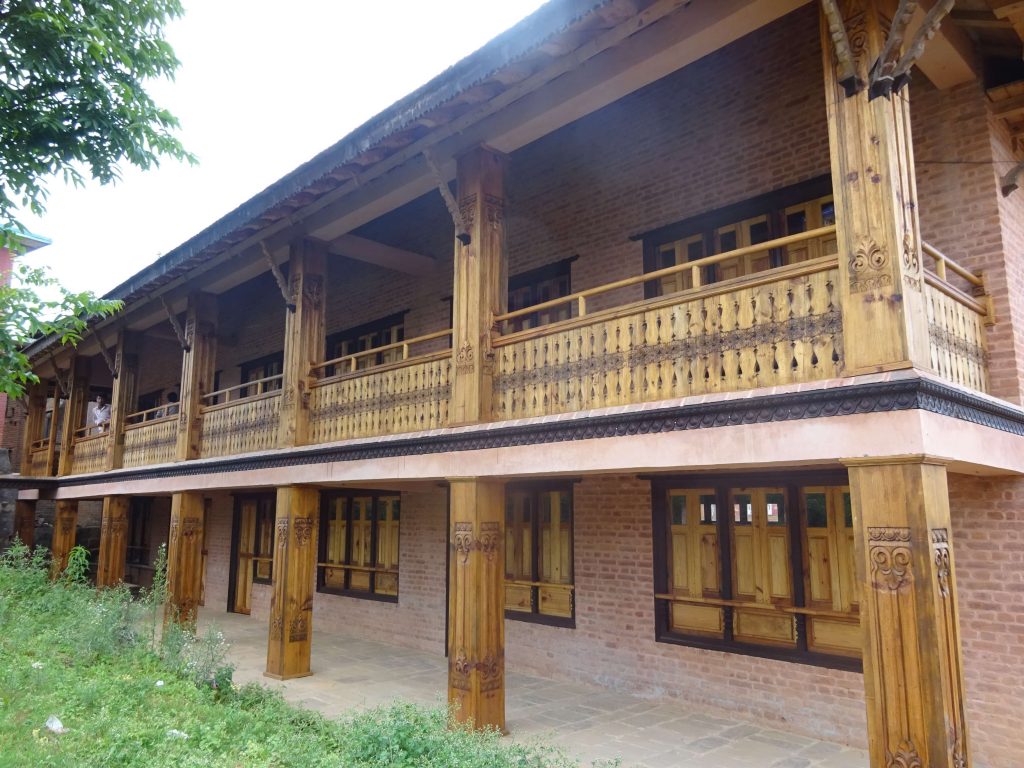 RPFC has been coordinating with the campaign of Schulerhilfe fur Nepal to construct community school buildings, associated structures and rehabilitating heritages, with about Rs 10m already collected reportedly for the campaign.
RPFC has been coordinating with the campaign of Schulerhilfe fur Nepal to construct community school buildings, associated structures and rehabilitating heritages, with about Rs 10m already collected reportedly for the campaign.
After the 2015 earthquake, Schulerhilfe fur Nepal helped with the distribution of Pall filters, reconstruction of damaged school buildings as well as some houses. It has also provided support to Dhulikhel Hospital, Scheer Memorial Hospital in Banepa, Sushma Koirala Hospital in Sankhu, Tilganga Eye Hospital, Iwamura Hospital in Bhaktapur, Bhaktapur Cancer Hospital, Shechen Clinic in Boudha and Manthali Hospital in Ramechhap through German Rotary Volunteer Doctors’ Organization.
Besides, in coordination with Schulerhilfe fur Nepal, Nepali doctors were sent to Germany for special training, according to Rabindra Puri. “Bahr also supported the construction of high temperature incinerators for waste disposal centers and smokeless stoves in rural areas for hospital waste management.”
Ramesh Kumar Hamal: New stock exchange is the need of the hour
The process to establish another stock exchange in the country has finally emerged on the horizon with the Supreme Court clearing the way for the Securities Board Nepal (Sebon) to issue licenses to operate stock and commodity exchanges, and stock brokerage firms. Following the court's verdict, Sebon has invited applications from interested parties.
Pratik Ghimire of ApEx talked to Ramesh Kumar Hamal, Chairman of Sebon to talk about the changes the issuance of licenses will bring in the capital market, among other topics. Excerpts:
How is Sebon moving ahead after the Supreme Court cleared the way to issue licenses for new stock exchange and stock brokerage firms?
As soon as the Supreme Court rejected the writ petition, we invited applications from interested parties for a new stock exchange and commodity exchange. As the deadline is over, we will review all the applications and proceed with license issuance as soon as possible. There will be no unnecessary delay from our side. We will provide a written note with reasons to those who have their applications disapproved.
Why has Sebon deemed the issuance of licenses necessary for the growth of the capital market in Nepal?
As the number of investors in the stock market has surged massively over the last few years, we need more than the existing 50 stock brokerage firms to provide better services to investors and better market practices. This is why, Sebon is also issuing new licenses for brokerage firms. It is also equally important to understand that increasing numbers alone is not sufficient, there should be better corporate governance practices and the firms should play a role in reducing costs for the investors and providing reliable services.
The rationale behind the new stock exchange and additional brokerage firms is to create a competitive market that will be beneficial to all. I am a strong believer in the fact that without competition, there will be no progress. The new stock exchange is the need of the hour. I am an advocate of good governance and believe good practices should be maintained in every private and government institution. People who are capable should always get the opportunity to work. The same goes for the security market too. The license is necessary for the growth of the capital market. It will open the doors of opportunity for 30m Nepalis.
Which areas Sebon is currently focusing on for improvement of the securities market?
Sebon is currently working to maintain good governance in the capital market. We want to ensure investors get prompt services and face no hassles in their capital market dealings. Besides working on issuing new licenses for the stock exchange, brokerage firms, and commodity exchange, we are also bringing small and medium enterprises (SMEs) into the capital market. We are also working on updated rules and regulations needed for the capital market. There are around 1,200 large tax paying companies in Nepal.
But less than 100 of them are listed in the secondary market. Sebon aims to list at least 400 of them in the next fiscal year, 600 in another fiscal year, and 1,000 within the next five years. The listing of these companies will help the market grow, which ultimately helps the national economy.
Tell us more about the SME platform that Sebon is planning to introduce.
I have been active for a long time to bring SMEs to the capital market through a separate platform. We can implement it within about two months if everything goes as planned. What we are trying to do through this is to inspire small businesses to come to the capital market. If large companies and small companies are kept in separate indexes, it helps in the overall development of entrepreneurs from every corner of the country. It will then help to increase the size of the country’s economy.
We have done great work in private equity ventures because it is an international practice that is successful across the globe. With the traditional banking system, it is not possible to grow our economy. Hence, the growth of private equity has become important. It will also attract foreign investment. But we don’t have the domain of private equity ventures. We are working on it.
It’s been over a year since you took the helm of Sebon as the chairman. What challenges have you encountered in this period?
I am very satisfied with my work. There were challenges of course but I faced them because I never compromise on good governance. I will always advocate bringing the world’s best practices. Some people wanted to create hurdles from the day I assumed office by spreading rumors and character assassination.
But I guess they failed. I think investors and other stakeholders trusted me because I have been working by prioritizing investors and markets at the center of everything. I have been utilizing my experience and knowledge from international markets.
What are your major achievements so far?
We brought the C-ASBA charge down to a maximum of Rs 5 which was up to Rs 100 previously. Sebon also worked on a fast-track basis to provide a 10 percent quota for migrant workers in the initial public offerings (IPOs) which has helped to increase the inflow of remittances through the legal channel. We have cleared up confusion regarding the mergers of publicly listed companies.
Now any application for merger/acquisition should be approved within three days through the integrated guidelines. Previously, these cases were suspended for years. We have arranged that the trading of shares of any company going for merger/acquisition should not be suspended for more than 15 days. In the meantime, we made it possible for the process of IPOs to conclude in 15 days.
How is Sebon working to put a stop to insider trading and other manipulative activities in the securities market?
In the 30-year history of Sebon, this is the first time that we have penalized people found guilty of insider trading. We have concluded two such cases and have adopted a zero-tolerance policy regarding the malpractices in the capital. The market will be fairer as insider trading and other manipulative practices will be strongly dealt with.
State of Economy: Internal economic problems shadow external sector recovery
With the weak revenue collection, the government is struggling in managing resources while the process of formulation of the federal budget for the next fiscal year is gaining momentum. In the last few months, the government has tried to restart economic activities with a series of measures including lifting the import restrictions and land plotting restrictions, but the efforts have not been reflected in the revenue collection.
With resource management becoming an uphill task, the government has decided to scrap the projects that did not start their work by mid-April. The Finance Ministry has decided not to proceed with the projects that are yet to start preliminary works.
Amid the resources crunch, the government a few months ago introduced austerity measures announcing to curtail expenses in a number of categories. The Finance Ministry has already shortlisted the projects and has sent a circular to the line ministries not to take forward projects that are not in top priority for now. 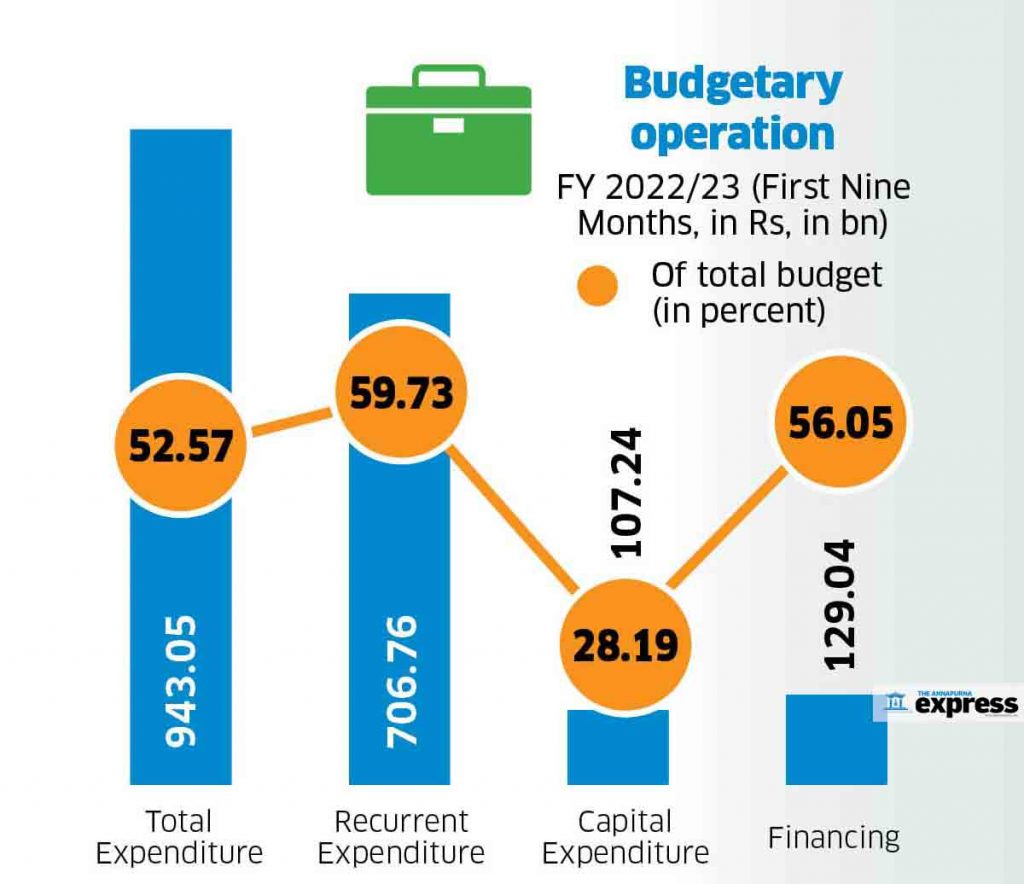 The data of the nine months of the current fiscal year of the Finance Ministry show revenue collection remains dismal even after the import restrictions were lifted. The federal government’s half of revenue comes from taxing imported goods. The Department of Customs (DoC) and Inland Revenue Department (IRD), the key agencies of the revenue regime, have reported poor revenue collection as of mid-April of this fiscal. DoC managed to collect only Rs 34.76bn in revenue in Chaitra (mid-March to mid-April) against the target of Rs 57.29bn.
The data of the nine months of the current fiscal year of the Finance Ministry show revenue collection remains dismal even after the import restrictions were lifted. The federal government’s half of revenue comes from taxing imported goods. The Department of Customs (DoC) and Inland Revenue Department (IRD), the key agencies of the revenue regime, have reported poor revenue collection as of mid-April of this fiscal. DoC managed to collect only Rs 34.76bn in revenue in Chaitra (mid-March to mid-April) against the target of Rs 57.29bn.
By the end of the third quarter of the current fiscal year, the department has managed to collect only Rs 285bn against the target of Rs 490bn, which is only 58 percent of the target. The story of IRD is also the same. The department has collected Rs 337bn in revenue as of mid-April, which is less than Rs 342.65bn collected during the same period last fiscal year 2021/22.
With DoC and IRD posting dismal results, the overall revenue of the federal government in the nine months of the current fiscal year has declined by 13.36 percent. The government’s revenue collection stood at Rs 683.20bn as of mid-April compared to Rs 789.26bn collected during the same period last fiscal year 2021/22, according to the Financial Comptroller General Office (FCGO). 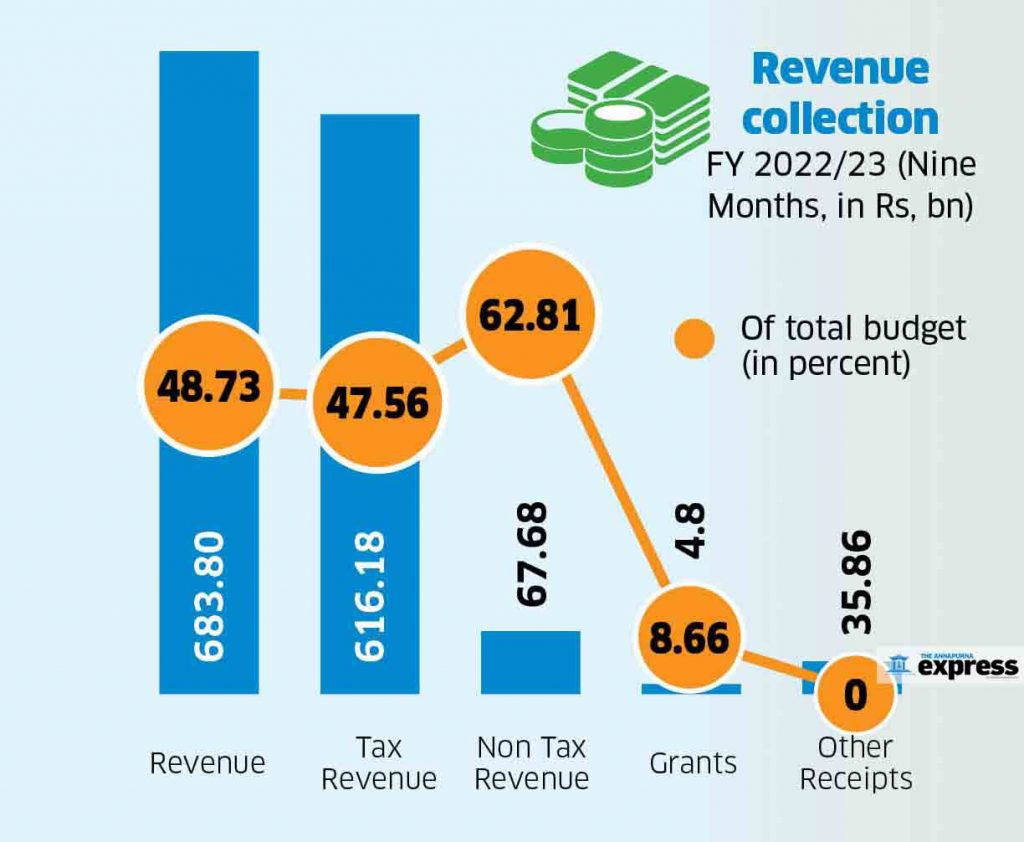 The collected revenue has not been enough even to meet the recurrent expenditure of the government which stood at Rs 706.76bn as of mid-April. The total expenditure of the government stood at Rs 943.05bn.
The collected revenue has not been enough even to meet the recurrent expenditure of the government which stood at Rs 706.76bn as of mid-April. The total expenditure of the government stood at Rs 943.05bn.
Continuous improvement in the external sector
With noticeable improvements in the country’s forex reserves, balance of payment (BOP), tourism income and remittance inflow, the recovery in the country’s external sector has continued. The country’s BOP is at a surplus of Rs 148.10bn in the eight months of FY 2022/23 compared to a deficit of Rs 258.64bn in the same period of FY 2021/22.
In US Dollar terms, the BOP is at a surplus of 1.12bn in the current fiscal year compared to a deficit of 2.17bn in the same period of the last fiscal year. 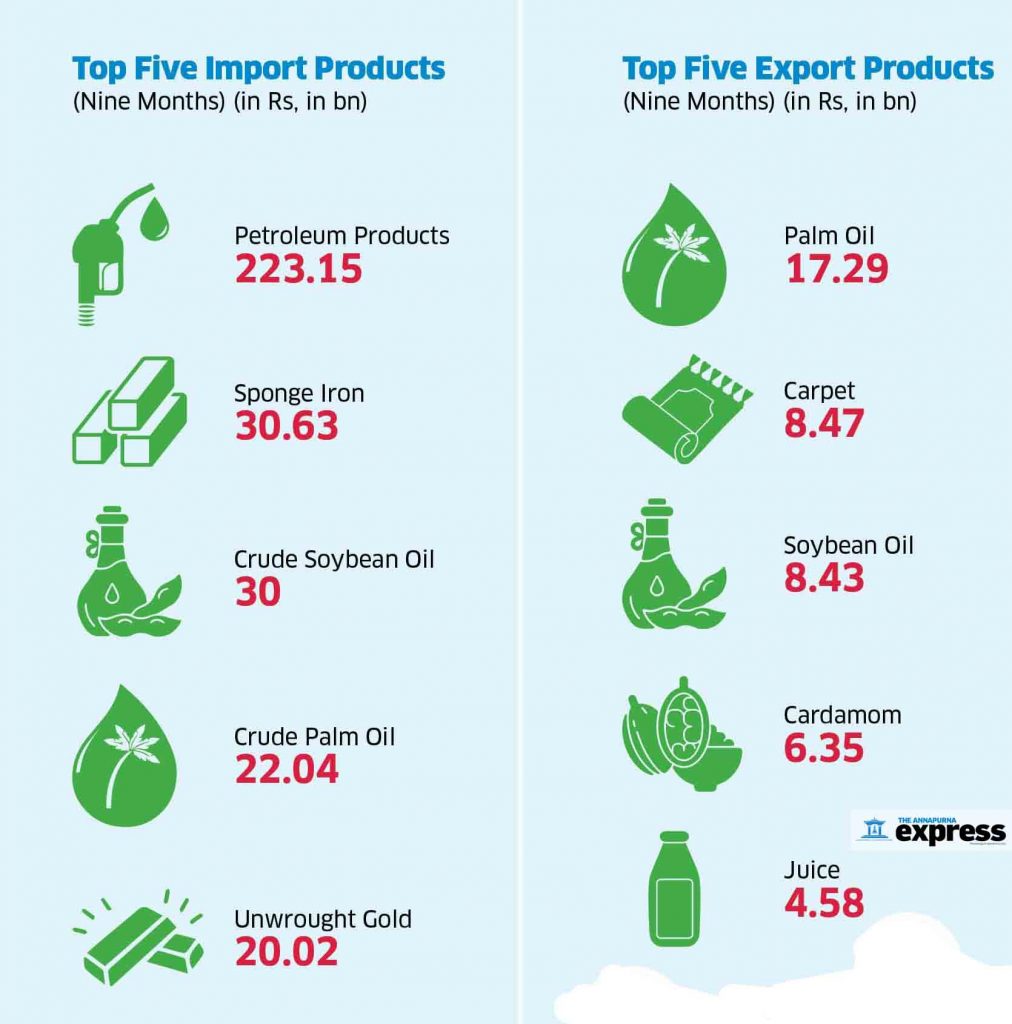 The country’s forex reserves increased by 15.2 percent in the review period. Nepal’s forex reserves stood at Rs 1,401.21bn in mid-March 2023 (Falgun) from Rs 1,215.80bn in mid-July 2022. In US dollar terms, the gross foreign exchange reserves increased by 12.1 percent to Rs 10.69bn in mid-March 2023 from Rs 9.54bn in mid-July 2022.
The country’s forex reserves increased by 15.2 percent in the review period. Nepal’s forex reserves stood at Rs 1,401.21bn in mid-March 2023 (Falgun) from Rs 1,215.80bn in mid-July 2022. In US dollar terms, the gross foreign exchange reserves increased by 12.1 percent to Rs 10.69bn in mid-March 2023 from Rs 9.54bn in mid-July 2022.
The central bank said that the foreign exchange reserves of the banking sector are sufficient to cover merchandise imports for 10.8 months, and merchandise and services imports for 9.4 months. Similarly, remittance inflows have increased by 25.3 percent to Rs 794.32bn in the review period. The inflow of remittances had decreased by 1.3 percent in the same period of the last fiscal year.
Imports start to surge 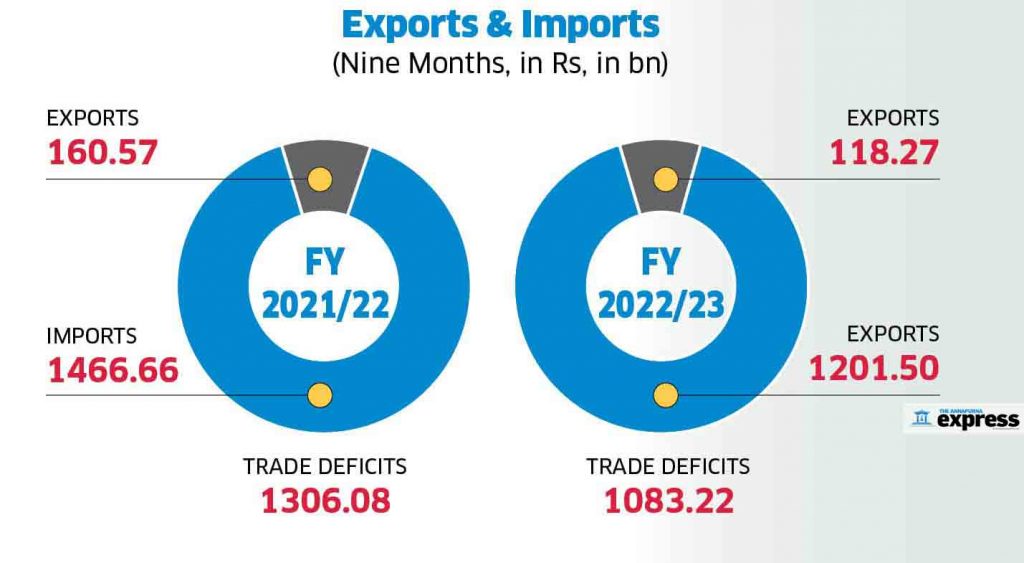 After the easing of the import restrictions, the country’s imports have started to surge again. Nepal imported goods worth Rs 143.123bn in Chaitra (mid-March to mid-April), the highest on a month-to-month basis, in the current fiscal year. The country imported goods worth Rs 139.22bn in Falgun (mid-February to mid-March), an increase of 10 percent compared to Magh (mid-January to mid-February).
After the easing of the import restrictions, the country’s imports have started to surge again. Nepal imported goods worth Rs 143.123bn in Chaitra (mid-March to mid-April), the highest on a month-to-month basis, in the current fiscal year. The country imported goods worth Rs 139.22bn in Falgun (mid-February to mid-March), an increase of 10 percent compared to Magh (mid-January to mid-February).
Nepal had imported goods worth Rs 142.31bn in Bhadra (mid-August-mid-September), the second highest on a month-to-month basis in FY 2022/23. However, the country’s total imports in the first nine months of the current fiscal year are lower than the last fiscal year. According to DoC, goods worth Rs 1,201.508bn were imported in the current fiscal year compared to Rs 1,466.662bn during the same period of the last fiscal year. The imports during the first nine months of this fiscal have declined by 18.08 percent.
Trade deficit decreased by 18 percent 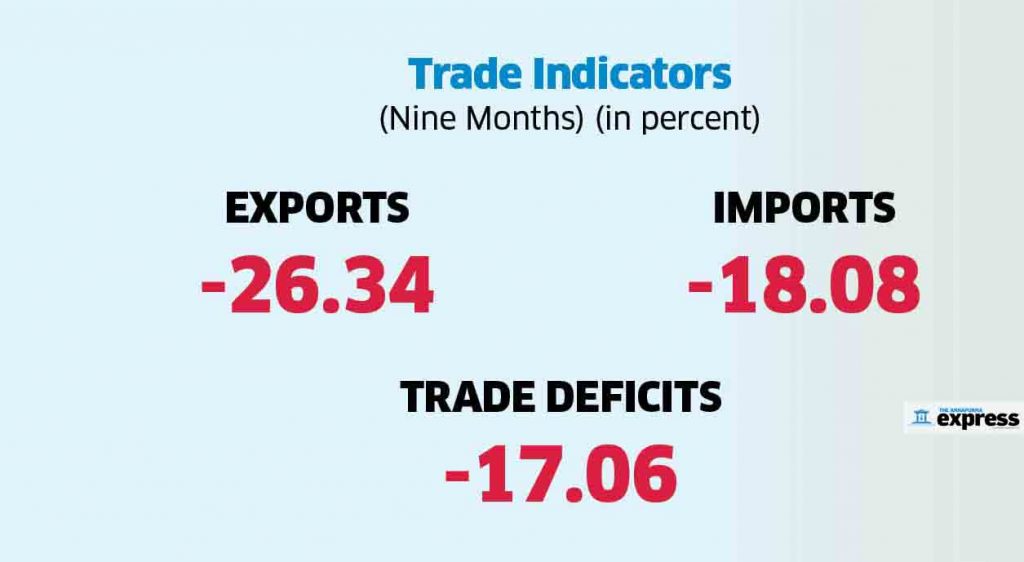 The country’s trade deficit has decreased by 17.06 percent in the nine months of the current fiscal year. According to DoC, the country’s total trade deficit has been limited to Rs 1,083.22bn in the nine months of FY 2022/23 compared to Rs 1,306.08bn during the same period of FY 2021/22.
The country’s trade deficit has decreased by 17.06 percent in the nine months of the current fiscal year. According to DoC, the country’s total trade deficit has been limited to Rs 1,083.22bn in the nine months of FY 2022/23 compared to Rs 1,306.08bn during the same period of FY 2021/22.
The trade deficit declined this fiscal as the country’s total foreign trade shrunk by 18.89 percent during the review period. Both imports and exports have decreased in the current fiscal year.
Tourist arrivals hit a four-year high in March 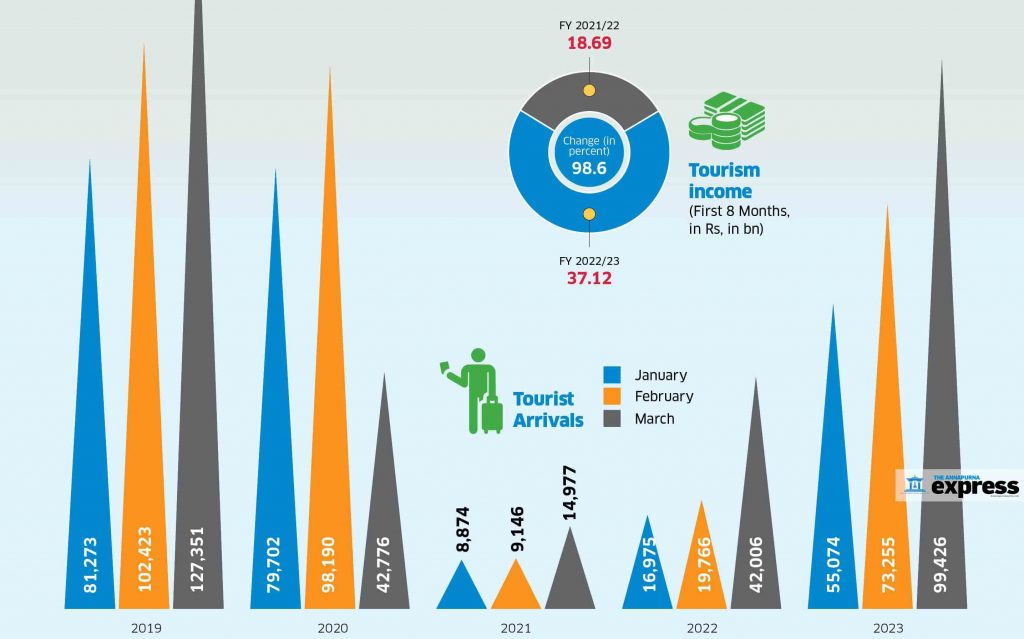 Continuing the upward momentum in 2023, the arrival of tourists in March hit a four-year high signaling that tourism in Nepal has largely recovered from the impacts of the Covid-19 pandemic. The latest statistics of the Nepal Tourism Board (NTB) show tourist footfalls in March 2023 stood at 99,426, the highest since March 2019.
Continuing the upward momentum in 2023, the arrival of tourists in March hit a four-year high signaling that tourism in Nepal has largely recovered from the impacts of the Covid-19 pandemic. The latest statistics of the Nepal Tourism Board (NTB) show tourist footfalls in March 2023 stood at 99,426, the highest since March 2019.
According to NTB, Nepal welcomed 42,006 tourists in March 2022, 14,977 tourists in March 2021, and 42,776 tourists in March 2020. According to NTB, 227,755 tourists visited Nepal in the first three months of 2023. Tourist arrivals have surged by 35 percent in March compared to February. Nepal welcomed 55,074 international visitors in January, 73,255 in February, and 99,426 in March.
Tourism income up by 98.6 percent 
With international travel coming back to normalcy, Nepal’s tourism earnings have also recovered significantly. According to Nepal Rastra Bank, Nepal earned Rs 37.12bn in the eight months of FY 2022/23 compared to Rs 18.69bn during the same period of FY 2021/22. The country's tourism earnings nosedived in FY 2019/20, and FY 2020/21 due to restrictions on international travel as countries imposed various lockdowns to contain the spread of the Covid-19 pandemic.
Forex reserves surged by 15.2 percent 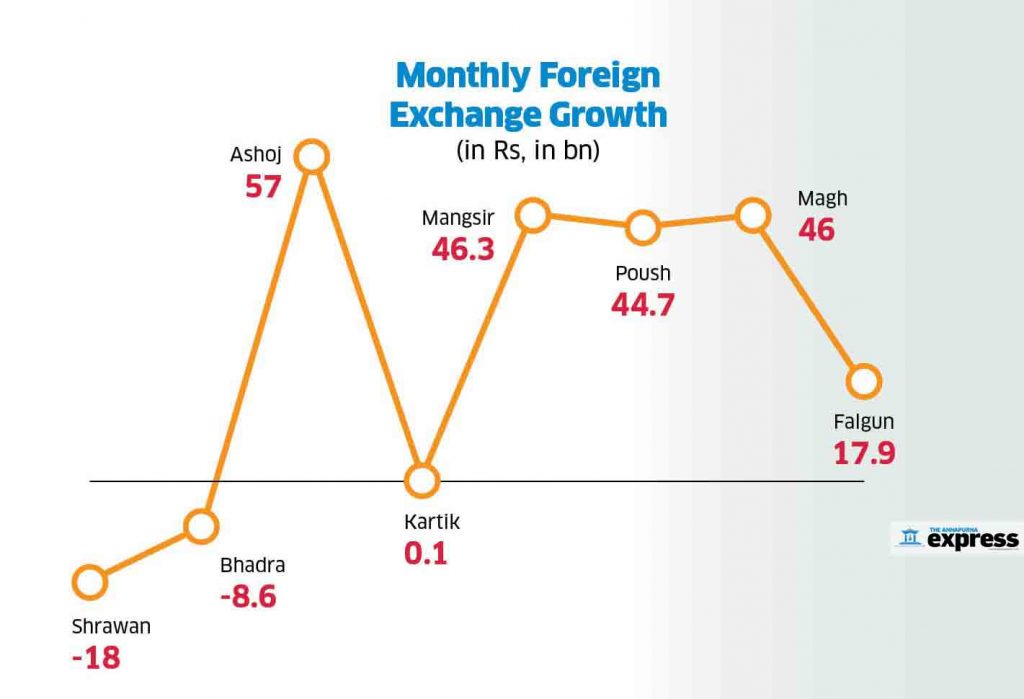 The country's forex reserves increased by 15.2 percent in the eight months of the current fiscal year. According to the NRB report, Nepal’s forex reserves stood at Rs 1401.21bn in mid-March, 2023 (Falgun) from Rs 1215.80bn in mid-July 2022. In US dollar terms, the gross foreign exchange reserves increased by 12.1 percent to Rs 10.69bn in mid-March 2023 from Rs 9.54bn in mid-July 2022.
The country's forex reserves increased by 15.2 percent in the eight months of the current fiscal year. According to the NRB report, Nepal’s forex reserves stood at Rs 1401.21bn in mid-March, 2023 (Falgun) from Rs 1215.80bn in mid-July 2022. In US dollar terms, the gross foreign exchange reserves increased by 12.1 percent to Rs 10.69bn in mid-March 2023 from Rs 9.54bn in mid-July 2022.
NRB in the report said the foreign exchange reserves of the banking sector are sufficient to cover merchandise imports for 10.9 months, and merchandise and services imports for 9.4 months.
Remittance inflow surged by 25.3 percent 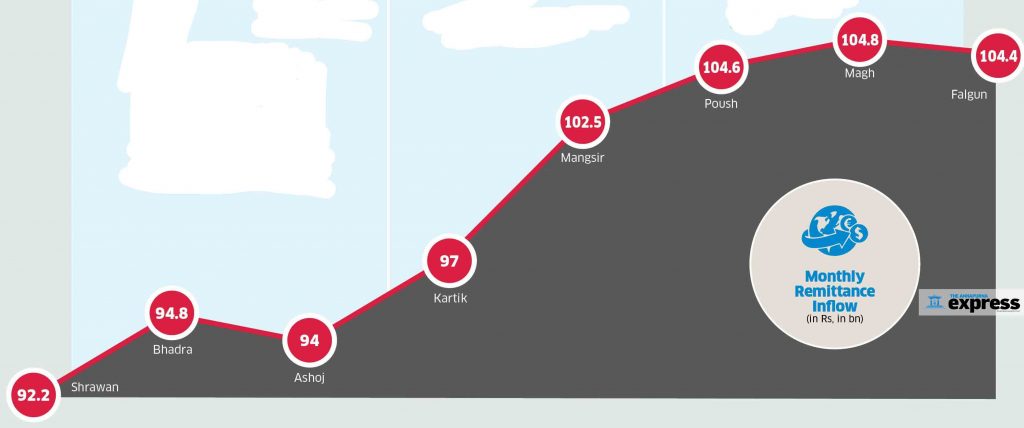 NRB has said that remittance inflow has increased by 25.3 percent to Rs 794.32bn in the eight months of the current fiscal year. Remittance had decreased by 1.3 percent in the same period of the last fiscal.
NRB has said that remittance inflow has increased by 25.3 percent to Rs 794.32bn in the eight months of the current fiscal year. Remittance had decreased by 1.3 percent in the same period of the last fiscal.
In US Dollar terms, remittance inflows increased by 14.8 percent to 6.09bn in the review period against a decrease of 2.6 percent in the same period of the previous year.
Petroleum products imports decline in quantity 
The quantity of all petroleum products (diesel, petrol, LPG, and ATF) has declined in the nine months of FY 2022/23. The quantity of diesel imports decreased by 26.85 percent in the review period compared to the same period of FY 2021/22. However, the import value has increased by 6.07 percent.
Similarly, the quantity of petrol imports also declined by 9.25 percent but the import value increased by 5.30 percent. This is mainly because of the surge in fuel prices caused by the Ukraine-Russia war.
Pawan Prajapati: FNCCI needs to focus on reducing gap between private sector and BFIs
The Federation of Nepalese Chamber of Commerce and Industry (FNCCI), the apex body Nepali private sector, has recently elected its new leadership. The representatives of FNCCI's district chambers and associate organizations across the country participated in the election. Pawan Prajapati, President of Pokhara Chamber of Commerce and Industry, was in Kathmandu to participate in the FNCCI jamboree. The entrepreneurs of Pokhara, one of Nepal’s major business hubs as well as tourism centers, have been affected by high interest rates and a slowdown in business activities.
Pratik Ghimire of ApEx talked to Prajapati regarding FNCCI’s new leadership and issues surrounding Pokhara’s business sector.
What should be the priority of the new leadership of FNCCI at a time when businesspersons across the country are facing multiple problems?
The new leadership of FNCCI has a lot of challenges ahead of it. Of late, the relationship between businesspersons and banks and financial institutions (BFIs) has soured due to high interest rates and a shortage of investible funds in the financial system. There have also been problems with imports and exports.
Hence, FNCCI should focus on creating a friendly environment between the private sector and the BFIs. Since the private and banking sectors are two sides of a coin, the new leadership should work to get out of the current crisis.
The government is working on the next fiscal year’s federal budget. What should be the focus of the upcoming federal budget?
We expect that the government will incorporate policies in the new budget that would help businesses. The government should create an environment where businesspersons will get loans easily, and that it safeguards local production and promotes exports. It will be better if the government consults with the private sector including FNCCI to make a package plan to reduce the trade imbalance.
As the President of the Pokhara Chamber of Commerce and Industry (PCCI), what are the new initiatives taken by PCCI in recent times?
Our team got elected only seven months ago. We took the leadership of the PCCI during a very challenging time. Yet, we have been working our best to help entrepreneurs. We have been regularly lobbying for a better business environment with the government and authorities concerned. For instance, our team recently met Prime Minister Pushpa Kamal Dahal and gave our suggestions to create a business friendly environment. Also, PCCI has planned to construct a multi-purpose building. It aims to promote the products of the producers of the Gandaki Province under one roof.
Which business sectors were the worst hit due to the high interest rates and liquidity crunch?
Pokhara is mainly known for its tourism industry. And it is the one that has been hard hit by the current economic recession. If the tourism business surges, all the other sectors in Pokhara will benefit. If our business becomes stable, it will help the national economy. Hence, the government should focus on boosting the tourism industry. And there is a narrative that Pokhara only has Fewa Lake and Mt Machhapuchhre. But we must work to establish more tourist attractions and destinations.
What is PCCI doing for tourism entrepreneurs?
PCCI has not waited for the government to act, but we have been working on our own to invite tourists. A team of tourism entrepreneurs from Pokhara is currently in Patna, India to promote Pokhara tourism. Tourists should not be forced to visit Nepal. It won’t help a bit. We should create an environment for them to come to Nepal on their own. However, this is not possible only with the efforts of PCCI. The FNCCI should have the same voice and the new leadership should help us with this.
Entrepreneurs in Pokhara held high hopes from the Pokhara International Airport. However, international airlines are yet to show any interest in the airport. What’s your say about this?
We have a lot of expectations from Pokhara International Airport, and we have requested the Prime Minister to seriously work on bringing international airlines to the airport as soon as possible. I hope the upcoming visit of the Prime Minister to India will give it a breakthrough. It will not only help Pokhara but the entire Gandaki Province. PCCI played a leading role in establishing the international airport. And if the government fails to start international flights from Pokhara, we will lobby to bring international airliners to the airport.
How much time do you think it will take for the economy to come out of the recession?
The Covid-19 pandemic, issues related to BFIs, and the Russia-Ukraine war affected our economy a lot. But the situation is gradually getting normalized, yet there is a long way to go. The Nepal Bankers' Association has also said that they will reduce the interest rate to single digits. If everything goes well, I guess the situation will be normal in a couple of months. The finance minister has said the same. We are ready to do everything at our disposal to revive the ailing economy.


